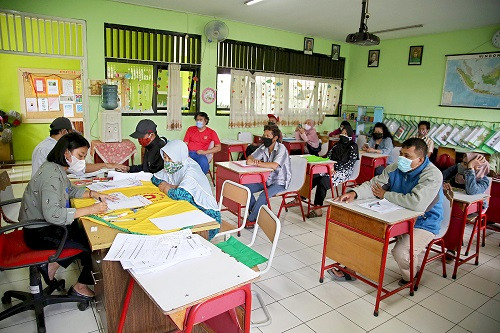Popular Reads
Top Results
Can't find what you're looking for?
View all search resultsPopular Reads
Top Results
Can't find what you're looking for?
View all search resultsStimulus should target ‘new poor’: World Bank
Although Indonesia’s support last year provided a meaningful boost amid the pandemic-induced downturn, the government is expected to channel support to the workers in the worst-hit industries.
Change text size
Gift Premium Articles
to Anyone
W
hile expanding cash assistance to poor households, the Indonesian government must target people who have lost jobs and incomes during the economic recession caused by the pandemic, according to World Bank economists.
Aaditya Mattoo, World Bank’s chief economist for East Asia and the Pacific, said the pandemic resulted in "new poor" from hard-hit sectors such as transportation, hospitality, retail and trade, some of whom might not be covered by the cash transfer or other in-kind transfer programs.
Although Indonesia’s support last year provided a meaningful boost amid the pandemic-induced downturn, the government is expected to channel support to the workers in the worst-hit sectors.
“One of the problems of Indonesia’s social security setup, while it is great at covering the lower income segments, there is this middle-income segment which has relatively fewer protections,” Mattoo told The Jakarta Post in a video interview on March 25.
Read also: Micro enterprises aid halved for this year, but coverage to be expanded
The government raised the budget for this year’s COVID-19 stimulus by 20.6 percent to Rp 699.4 trillion (US$48.22 billion) from last year’s actualized budget. Of this year’s budget, 27 percent is for small business assistance, 23 percent social protection and 8 percent for business incentives, among other allocations.
It reported last year’s support eased the pandemic’s impact on poverty, resulting in a poverty rate increase of just 0.97 percentage points year-on-year (yoy) to 10.19 percent in September 2020, according to Statistics Indonesia (BPS). This meant 2.76 million people fell into poverty, which was claimed to be less than predicted.
Read also: Poverty rate hits three-year high
“The upside is you give relief to those who need it, and you have a greater multiplier effect because people who need it, spend it,” said Mattoo.
The World Bank estimated the pandemic could send some 8.5 million Indonesians into poverty without any social assistance. Similarly, SMERU Research Institute projected 8.45 million new poor if the annual economic growth stood at 1 percent, which would bring the poverty rate to 12.37 percent.
Mattoo said when the country moved to the third stage of recovery, when the government was not just concerned with relief or recovery but thinking of future investment, more efficient and sensible project selection, more streamlined investment, might yield a four times higher result.
World Bank economist Ergys Islamaj said the shift to focus on hard-hit sectors such as the tourism sector was critical, since they were not expected to recover in the short run.
To extend the support beyond the bottom 40 percent of the population, the government continued this year the Pre-Employment Card program to cover up to 5.6 million pandemic-hit workers and small business owners with a budget of Rp 20 trillion.
As of Feb. 28, the government had spent Rp 26.8 trillion on social assistance, according to the Finance Ministry. Of the assistance, Rp 5.8 trillion was for Social Cash Transfer (BST), Rp 6.4 trillion for the Staple Food Card and Rp 6.8 trillion for the Family Hope Program, among other programs.
While most households received at least one form of assistance, some 38 percent of the households in the bottom 40 percent did not receive any cash assistance in the October-November period, according to a survey by the SMERU Research Institute, the United Nations Development Program (UNDP), the United Nations Children’s Fund (UNICEF) and the Australia-Indonesia Partnership for Economic Development (PROSPERA).
The survey involved 12,216 households and was conducted from October to November 2020 in all 34 provinces in the country.
Read also: SMERU finds incomes shrink for 75% of Indonesian homes in 2020
Despite the large amount of support for small businesses, only 7.5 percent of the surveyed households running a small business reported they received the support.
“Forty percent of small business owners said they were not aware that government assistance was available,” read the SMERU report.
With the COVID-19 stimulus widening the budget deficit, the government has set out a fiscal consolidation plan and is seeking to bring down the deficit back to below the normal ceiling of 3 percent of gross domestic product (GDP) by 2023. The deficit reached 6.03 percent last year and was estimated to reach 5.07 percent this year.










